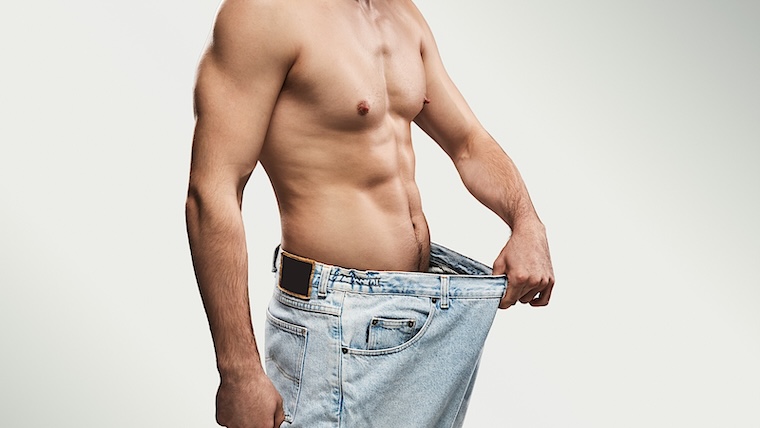Body fat is vital for maintaining hormone levels and supporting testosterone production, both crucial for muscle growth. However, excessive fat storage can negatively impact health and hinder the development of the lean, aesthetic physique many desire.
This raises the question: what’s the ideal body fat percentage to build muscle effectively? Does a higher body composition correlate with more muscle gains?
Exercise physiologist Dr. Mike Israetel and Duke University health and wellness researcher Dr. Eric Trexler dove into this topic in detail on Oct. 16, 2024, sharing insights on the relationship between body fat and muscle gain.
[Related: Larry Wheels Infuriates Physicists, Performs Muscle-Ups at 270LB]
Can One Be Too Fat To Gain Muscle?
To address the concern of excess body fat hindering muscle storage, Dr. Israetel examines the relevant theories and evaluates the data. Dr. Trexler references a comprehensive study by Forbes exploring weight loss, weight gain, and the proportions of fat versus lean muscle gained. However, a notable limitation of the study is that none of the participants engaged in weightlifting. (1)
“We can talk about what your body is inclined to do with some extra calories here and there, but what about when you crush it with heavy barbells all day?” Dr. Trexler questioned.
Dr. Trexler explored the effects of weight regain in individuals with shredded physiques, referencing the Minnesota Starvation Experiment, highlighting how individuals tend to regain fat preferentially during the initial stages of weight recovery. (2)
In his own rigorous study to develop a metric for body recomposition — losing fat while gaining muscle — Dr. Trexler found that in a group where few were shredded, participants gained similar amounts of fat-free mass. However, those with higher body fat percentages experienced greater success in a body composition.

Dr. Trexler further assessed a study involving teenage sumo wrestlers, who lost approximately 0.1 kilograms (0.2 pounds) and gained 2 kilograms (4.4 pounds) of fat-free mass over a six-month training period. (3) Based on his findings, he concluded that the body fat percentage threshold for effectively achieving lean gains is likely above 33%.
Are There Reasons To Get Leaner?
Despite a high body fat percentage threshold for one’s ability to gain lean muscle, Dr. Israetel suggests three reasons to get leaner:
- Health
- Aesthetics
- Muscle endurance
[Related: Aesthetics vs. Appearances: What Makes a Bodybuilder?]
Health
Being healthy is important, especially for sports performers. “If you get healthier, there’s a compelling case to get a little bit leaner, so you have more health,” Israetel states.
Aesthetic Preference
This perspective is particularly relevant for bodybuilders, for whom appearance is critical to success. “If I look like a block of cheese, why am I even in here?” Israetel comments.
Muscle Endurance
Dr. Israetel personal experience is when he was overweight, he faced significant challenges with mobility and executing exercises. With a body fat percentage between 25% and 30%, his endurance for reps within a set and recovery between sets was notably low. He struggled with mobility and proper technique during leg and back exercises.
Dr. Trexler added that while it’s possible to build muscle at a higher body fat percentage, achieving a leaner physique beforehand can offer several advantages:
- Feeling Better
- Better Health
- More Engaged in the Process
- Physically Look Better
[Related: What Is a Healthy Body Fat Percentage?]
What’s the Ideal Fat Range To Stay In?
Dr. Israetel stated that individuals with body fat percentages of 15% to 20% can still gain lean muscle — this capability doesn’t diminish at lower fat levels, such as 12%. The ideal fat range for optimal performance is between 10% and 25% for men.
However, Dr. Trexler emphasized maintaining fat-free mass during a cutting phase. To preserve this mass, consuming ample protein and engaging in strength training is essential.
Dr. Israetel highlighted maintaining strength in repetitions. Failing to consume enough protein and neglecting training while cutting can lead to a loss of fat-free mass, often resulting in an insatiable appetite when attempting to return to a bulked-up state.
This phenomenon is known scientifically as hyperphagia, characterized by an overwhelming urge to eat, which can lead to excessive fat gain rather than lean mass increases.
More Bodybuilding Content
- “He’s a Motherf%#ker”: Jay Cutler on the Most “Abrasive” Coach in Bodybuilding
- Jeff Nippard Ranks Best and Worst Biceps Exercises
- BREAKING: Chris Bumstead To Compete in Men’s Open Bodybuilding Division at 2024 Prague Pro
References
- Forbes G. B. (2000). Body fat content influences the body composition response to nutrition and exercise. Annals of the New York Academy of Sciences, 904, 359–365. https://doi.org/10.1111/j.1749-6632.2000.tb06482.x
- Dulloo A. G. (2021). Physiology of weight regain: Lessons from the classic Minnesota Starvation Experiment on human body composition regulation. Obesity reviews : an official journal of the International Association for the Study of Obesity, 22 Suppl 2, e13189. https://doi.org/10.1111/obr.13189
- Ogawa, M., Uchizawa, A., Tamai, S., Momma, R., Hoshi, D., Kondo, E., Sagayama, H., & Watanabe, K. (2024). Evaluation of Energy Balance Estimated From Total Energy Expenditure and Body Composition Changes in Junior Sumo Wrestlers: An Observational Study Over Six Months. Cureus, 16(5), e61158. https://doi.org/10.7759/cureus.61158
Featured image via Shutterstock/Max kegfire